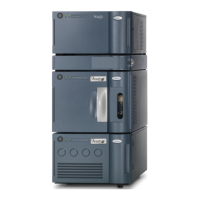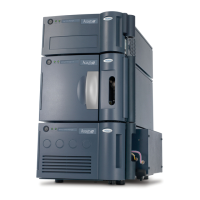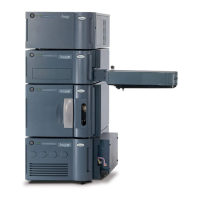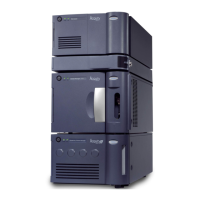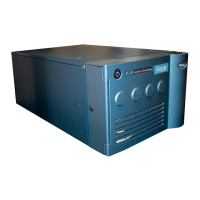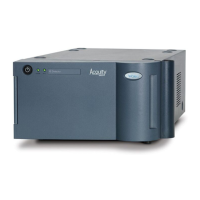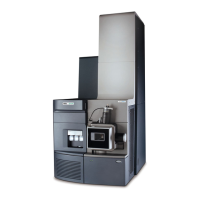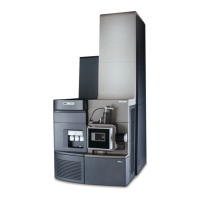Do you have a question about the Waters ACQUITY Arc System and is the answer not in the manual?
Legal notice regarding copyright ownership and reproduction rights of the document.
List of registered and unregistered trademarks associated with Waters Corporation products.
Information on how to provide feedback or report errors in the document.
Details on how to contact Waters Corporation for technical assistance or inquiries.
Explains the meaning and use of safety hazard symbols in documentation.
Warning about using the correct type of power cord to avoid electric shock.
Warning to keep hands clear of moving parts to avoid crush injuries.
Precautions to observe regarding high voltage components to avoid electric shock.
Prohibits placing vessels containing liquid on equipment to prevent shock or fire.
Information regarding compliance with FCC rules for electromagnetic interference.
Guidance on positioning instruments to ensure easy disconnection of the power cord.
Warning that improper equipment use may compromise safety protections.
Refers to an appendix for a comprehensive list of warning advisories and notices.
Description and meaning of symbols used in instrument manuals and on equipment.
Defines the intended audience and purpose of the system guide.
Details the applications and environments for which the ACQUITY Arc system is designed.
Guidelines for calibrating LC systems using standard curves and acceptable methods.
Procedures for running and evaluating QC samples to ensure system performance.
Information related to Electromagnetic Compatibility (EMC) standards and compliance.
Statement of compliance with Canadian emissions standards for digital apparatus.
Classification of the instrument according to ISM instrument requirements.
Identifies the authorized representative within the European Community.
Key recommendations for achieving optimum performance and separation in UHPLC analysis.
Explanation of carryover in chromatography and methods to minimize it.
Specifies the precision and reproducibility limits for injection volumes.
Methods for reducing cycle time, such as using the Load Ahead option.
Information on preventing leaks in tubing connections and system integrity.
Procedures and information required when contacting Waters Technical Service.
Lists periodic maintenance schedules for optimal system performance.
Guidance on using only Waters Quality Parts to ensure system operation.
Information on using the Connections INSIGHT service for proactive support.
How to set up maintenance counters and warnings to minimize downtime.
Overview of connecting chromatographic tubing and system components.
Diagrams and details for rear-panel wiring connections between modules.
Diagrams illustrating the plumbing connections for system modules.
Illustrations showing the proper routing of waste and condensate tubing.
Instructions for connecting modules to a grounded power source.
Details on connecting signal cables using appropriate tools and materials.
Guidance on connecting system modules and the PC via Ethernet.
Identifies hazard symbols and their associated risks (death, injury, adverse reactions).
Provides specific safety warnings, such as burst warnings for nonmetallic tubing.
Warning concerning handling of biological agents and infectious materials.
Warning related to handling biohazards, toxic, or corrosive materials.
Alerts to potential damage or integrity compromise, often with an exclamation point symbol.
Warns of equipment damage risk from solvent spills and proper bottle placement.
Highlights the need for personal protective equipment like eye protection and gloves.
General warnings about operating equipment not specified by the manufacturer.
Safety instructions and guidance for replacing fuses in instruments.
Description of electrical symbols found on instruments and in manuals.
Explanation of symbols used on packaging for shipping and handling instructions.
Information on preventing contamination in LC/MS and HPLC/MS systems.
Importance of using clean solvents for reproducible results and minimal maintenance.
Recommendations for solvent grade (MS or HPLC) and filtration.
Guidance on proper solvent preparation, primarily filtration, to prevent pumping issues.
Recommendations for using high-quality water and preventing microbial growth.
Instructions for preparing and using buffers, including flushing procedures.
Guidance on determining solvent miscibility for changing mobile phases.
Explanation of M-numbers for predicting miscibility of liquids.
Information on solvent stabilizers and precautions for handling them.
Discussion on the role of solvent viscosity in gradient chromatography.
Guidance on selecting wavelengths for optimal detection and reduced baseline noise.
Table of UV cutoff wavelengths for common chromatographic solvents.
Provides approximate wavelength cutoffs for various solvents, buffers, and mobile phases.
Lists mobile phase absorbances at different wavelengths to help reduce baseline noise.
Key performance specifications for the ACQUITY Arc system as a whole.
Detailed technical specifications for the QSM-R module.
Detailed technical specifications for the SM FTN-R module.
Specifications for the 30-cm Column Heater and Heater/Cooler modules.
Specifications for the optional 30-cm Column Heater-Active module.
Specifications related to informatics compatibility and communications.
Operating environmental ranges including temperature and humidity.
Technical specifications for power requirements and line frequency.
Dimensions and weight specifications for the ACQUITY Arc system.
| Wavelength Range (PDA) | 190 to 800 nm |
|---|---|
| Wavelength Range (TUV) | 190 to 400 nm |
| Data Management | Empower Software |
| Pump Type | Quaternary solvent blending |
| Gradient Delay Volume | 650 µL |
| Autosampler Type | FTN (Flow-Through Needle) |
| Sample Capacity | Up to 96 samples |
| Injection Volume Range | 0.1 to 100 µL |
| Detector Options | PDA, TUV |
| Dimensions (W x D x H) | Varies by configuration |
| Weight | Varies by configuration |
| Operating Temperature | 15°C to 30 °C |
